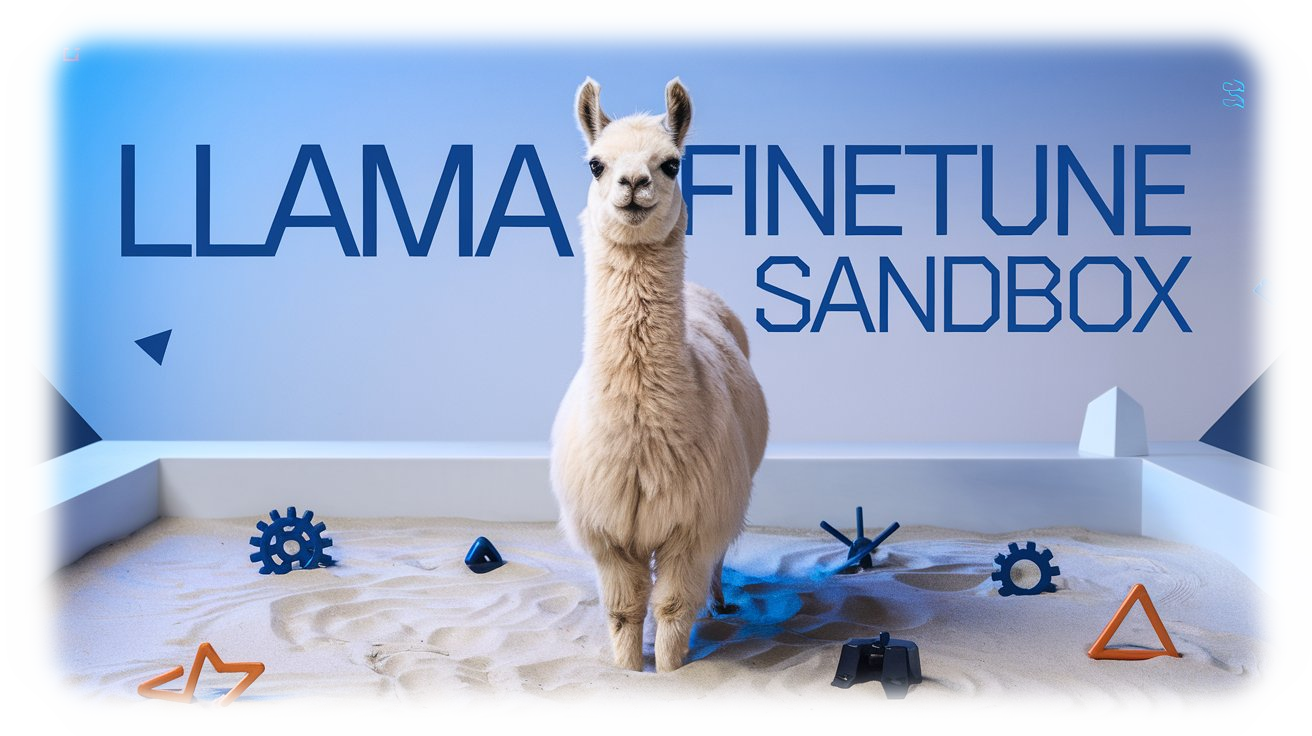---
title: Llama-finetune-sandbox
emoji: 🦙
colorFrom: blue
colorTo: purple
sdk: streamlit
sdk_version: 1.39.0
app_file: app.py
pinned: false
license: mit
---

🌟 Llama-finetune-sandbox 🌟




Llama Model Fine-tuning Experiment Environment





## 🚀 Project Overview
**Llama-finetune-sandbox** provides an experimental environment for learning and verifying Llama model fine-tuning. You can try various fine-tuning methods, customize models, and evaluate performance. It caters to a wide range of users, from beginners to researchers. Version 0.7.0 includes updated documentation and the addition of a guide for implementing high-speed inference using Unsloth.
## ✨ Key Features
1. **Diverse Fine-tuning Methods**:
- LoRA (Low-Rank Adaptation)
- QLoRA (Quantized LoRA)
2. **Flexible Model Configuration**:
- Customizable maximum sequence length
- Various quantization options
- Multiple attention mechanisms
3. **Experiment Environment Setup**:
- Memory usage optimization
- Visualization of experimental results
4. **Context-Aware Reflexive QA Generation System**:
- Generates high-quality Q&A datasets from Wikipedia data.
- Uses LLMs to automatically generate context-aware questions and answers, evaluate quality, and iteratively improve them.
- Employs a reflexive approach, quantifying factuality, question quality, and answer completeness to evaluate and iteratively improve the generated Q&A pairs.
- Provides code and explanations covering environment setup, model selection, data preprocessing, Q&A pair generation, quality evaluation, and the improvement process.
- Uses libraries such as `litellm`, `wikipedia`, and `transformers`.
- Generated Q&A pairs are saved in JSON format and can be easily uploaded to the Hugging Face Hub.
5. **LLM Evaluation System**:
- Automatically evaluates the quality of LLM responses.
- Evaluates questions, model answers, and LLM responses on a 4-point scale, generating detailed evaluation reports.
- Features error handling, retry functionality, logging, customizable evaluation criteria, and report generation in CSV and HTML formats.
- Also includes functionality for uploading to the Hugging Face Hub.
## 🔧 Usage
Refer to the notebooks in this repository.
## 📦 Installation Instructions
Refer to `requirements.txt` and install the necessary packages.
## 📚 Implementation Examples
This repository includes the following implementation examples:
### High-Speed Fine-tuning using Unsloth
- High-speed fine-tuning implementation for Llama-3.2-1B/3B models
- → See [`Llama_3_2_1B+3B_Conversational_+_2x_faster_finetuning_JP.md`](sandbox/Llama_3_2_1B+3B_Conversational_+_2x_faster_finetuning_JP.md) for details.
- → [Use this to convert from Markdown to Notebook format](https://huggingface.co/spaces/MakiAi/JupytextWebUI)
- [📒Notebook here](https://colab.research.google.com/drive/1AjtWF2vOEwzIoCMmlQfSTYCVgy4Y78Wi?usp=sharing)
### High-Speed Inference using Unsloth
- High-speed inference implementation for Llama-3.2 models
- → See [`Unsloth_inference_llama3-2.md`](sandbox/Unsloth_inference_llama3-2.md) for details.
- → Implementation of efficient inference processing for the Llama-3.2 model using Unsloth
- [📒Notebook here](https://colab.research.google.com/drive/1FkAYiX2fbGPTRUopYw39Qt5UE2tWJRpa?usp=sharing)
- High-speed inference implementation for LLM-JP models
- → See [`Unsloth_inference_llm_jp.md`](sandbox/Unsloth_inference_llm_jp.md) for details.
- → Implementation and performance optimization of high-speed inference processing for Japanese LLMs
- [📒Notebook here](https://colab.research.google.com/drive/1lbMKv7NzXQ1ynCg7DGQ6PcCFPK-zlSEG?usp=sharing)
### Efficient Model Operation using Ollama and LiteLLM
- Setup and operation guide on Google Colab
- → See [`efficient-ollama-colab-setup-with-litellm-guide.md`](sandbox/efficient-ollama-colab-setup-with-litellm-guide.md) for details.
- [📒Notebook here](https://colab.research.google.com/drive/1buTPds1Go1NbZOLlpG94VG22GyK-F4GW?usp=sharing)
### Q&A Dataset Generation from Wikipedia Data (Sentence Pool QA Method)
- High-quality Q&A dataset generation using the sentence pool QA method
- → A new dataset creation method that generates Q&A pairs while maintaining context by pooling sentences separated by punctuation marks.
- → Chunk size is flexibly adjustable (default 200 characters) to generate Q&A pairs with optimal context range depending on the application.
- → See [`wikipedia-qa-dataset-generator.md`](sandbox/wikipedia-qa-dataset-generator.md) for details.
- [📒Notebook here](https://colab.research.google.com/drive/1mmK5vxUzjk3lI6OnEPrQqyjSzqsEoXpk?usp=sharing)
### Context-Aware Reflexive QA Generation System
- Q&A dataset generation with reflexive quality improvement
- → A new method that automatically evaluates the quality of generated Q&A pairs and iteratively improves them.
- → Quantifies factuality, question quality, and answer completeness for evaluation.
- → Generates highly accurate questions and checks the consistency of answers using contextual information.
- → See [`context_aware_Reflexive_qa_generator_V2.md`](sandbox/context_aware_Reflexive_qa_generator_V2.md) for details.
- [📒Notebook here](https://colab.research.google.com/drive/1OYdgAuXHbl-0LUJgkLl_VqknaAEmAm0S?usp=sharing)
### LLM Evaluation System (LLMs as a Judge)
- Advanced quality evaluation system utilizing LLMs as evaluators
- → Automatically evaluates questions, model answers, and LLM responses on a 4-point scale.
- → Robust design with error handling and retry functionality.
- → Generates detailed evaluation reports in CSV and HTML formats.
- → See [`LLMs_as_a_Judge_TOHO_V2.md`](sandbox/LLMs_as_a_Judge_TOHO_V2.md) for details.
- [📒Notebook here](https://colab.research.google.com/drive/1Zjw3sOMa2v5RFD8dFfxMZ4NDGFoQOL7s?usp=sharing)
## 🆕 What's New (v0.7.0)
- **Addition of a guide for high-speed inference implementation using Unsloth**: Added information on high-speed inference implementation for Llama-3.2 and LLM-JP models, how to use each model, and links to Colab notebooks.
- Updated documentation
## 🤝 Contributions
- Implementation of new fine-tuning methods
- Bug fixes and feature improvements
- Documentation improvements
- Addition of usage examples
## 📄 License
This project is licensed under the MIT License.





